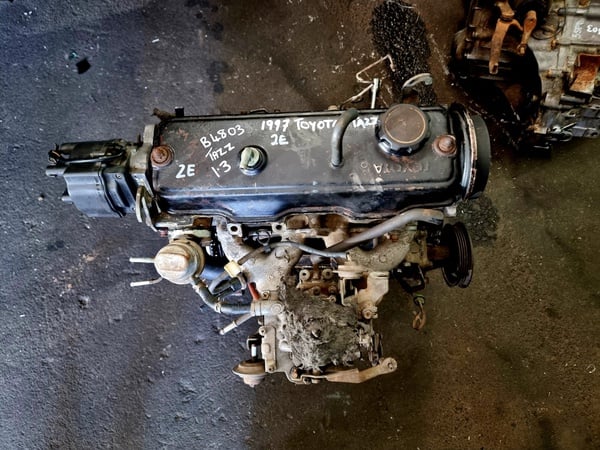Discover Reliable Toyota Tazz Engine for Sale: Auto Parts Depot
Discover Reliable Toyota Tazz Engine for Sale: Auto Parts Depot
Blog Article
Engine Purchasing Professional Tips on Choosing the Right Engine for Your Particular Requirements
Choosing the appropriate engine for your certain demands entails an intricate interplay of factors that exceed plain horsepower numbers. From power output to sustain effectiveness, the decision-making process can be discouraging. Recognizing the nuances of engine kinds, dimensions, and their compatibility with your lorry is crucial. There are experienced pointers that can aid browse this terrain with self-confidence. By delving right into the details of power versus effectiveness, evaluating gas ratings, and budgeting for lasting prices, one can genuinely enhance their engine choice.
Power Vs. Effectiveness: Finding the Balance

When picking an engine, it is critical to strike a balance in between power and effectiveness to fulfill your specific demands effectively. Power describes the engine's capability to create power for propulsion, figuring out factors like acceleration, towing capacity, and general efficiency (Toyota Tazz Engine For Sale). On the various other hand, efficiency connects to just how well the engine makes use of gas to produce power, impacting elements such as fuel economic situation and ecological kindness
Attaining the best equilibrium in between power and efficiency is crucial since an engine that is as well powerful might eat too much gas, resulting in greater operating expenses and unnecessary stress on the environment. Alternatively, an engine that prioritizes performance over power might lead to slow efficiency, particularly in demanding situations like lugging hefty loads or driving uphill.
To make a notified choice, take into consideration elements such as your regular driving problems, the designated use of the car, and your personal preferences. By evaluating your concerns and requirements, you can pick an engine that strikes the perfect equilibrium in between power and effectiveness, ensuring optimum efficiency while lessening ecological influence and operating expenses.
Recognizing Engine Size and Type

Typical engine types consist of inline engines, V engines, and rotating engines, each with its one-of-a-kind advantages and downsides. Comprehending the interaction between engine dimension and kind is vital in selecting an engine that straightens with your details requirements and concerns, whether it be power, efficiency, or an equilibrium of both.
Consider Your Lorry's Demands
If you are looking for an engine for a durable vehicle that will certainly be made use of for towing, you will need an effective engine with high torque capacities. On the other hand, if you are selecting an engine for a small cars and truck largely used for city travelling, gas performance may be a much more important factor to consider.

Reviewing Gas Effectiveness Rankings
Examining fuel effectiveness rankings is a crucial facet of picking the appropriate engine for your lorry, making certain price financial savings and ecological sustainability. Fuel efficiency rankings, commonly gauged in miles per gallon (MPG) for gas engines or kilowatt-hours per 100 miles (kWh/100 miles) for electric engines, suggest how far a lorry can take a trip on a particular amount of gas or power. Greater MPG or reduced kWh/100 miles values signify extra effective engines, translating to lowered gas costs and reduced carbon discharges.
When assessing gas effectiveness ratings, consider your driving behaviors and requirements. If you commute cross countries daily, a highly fuel-efficient engine can cause considerable savings with time. Additionally, contrast different engine choices within the same vehicle course to identify one of the most economical option. Factors such as engine dimension, weight, the rules of aerodynamics, and crossbreed or electrical abilities can all affect fuel performance.
Budgeting for Long-Term Expenses
Tactically planning for long-term costs is imperative when selecting an engine, making certain click to read more financial sustainability over the lorry's life-span. While the first acquisition cost of an engine is a considerable element, it is important to think about the long-term costs linked with upkeep, repair services, and fuel consumption.
Moreover, investigating the availability and expense of substitute parts for the chosen engine is vital in budget plan preparation. By thoroughly budgeting for these lasting costs and factoring them right into the decision-making procedure, individuals can choose an engine that not just meets their instant demands but additionally remains economical throughout its life-span.
Conclusion
In final thought, picking the best engine for your certain demands requires balancing power and effectiveness, recognizing engine size visit this website and type, considering your automobile's needs, evaluating gas performance rankings, and budgeting for long-term costs. By very carefully taking into consideration these factors, you can guarantee that you select an engine that satisfies your requirements and offers optimum efficiency for your lorry.
To better fine-tune the choice process of an engine that strikes the ideal balance between power and effectiveness, it is crucial to delve into the complexities here are the findings of comprehending engine dimension and kind. Engine size refers to the overall volume of air and fuel that can be pushed through the engine cylinders. Common engine types consist of inline engines, V engines, and rotating engines, each with its one-of-a-kind benefits and downsides. Recognizing the interaction in between engine size and type is vital in selecting an engine that aligns with your specific demands and top priorities, whether it be power, performance, or an equilibrium of both.
Fuel efficiency ratings, typically gauged in miles per gallon (MPG) for fuel engines or kilowatt-hours per 100 miles (kWh/100 miles) for electrical engines, suggest how much an automobile can travel on a particular amount of gas or power.
Report this page